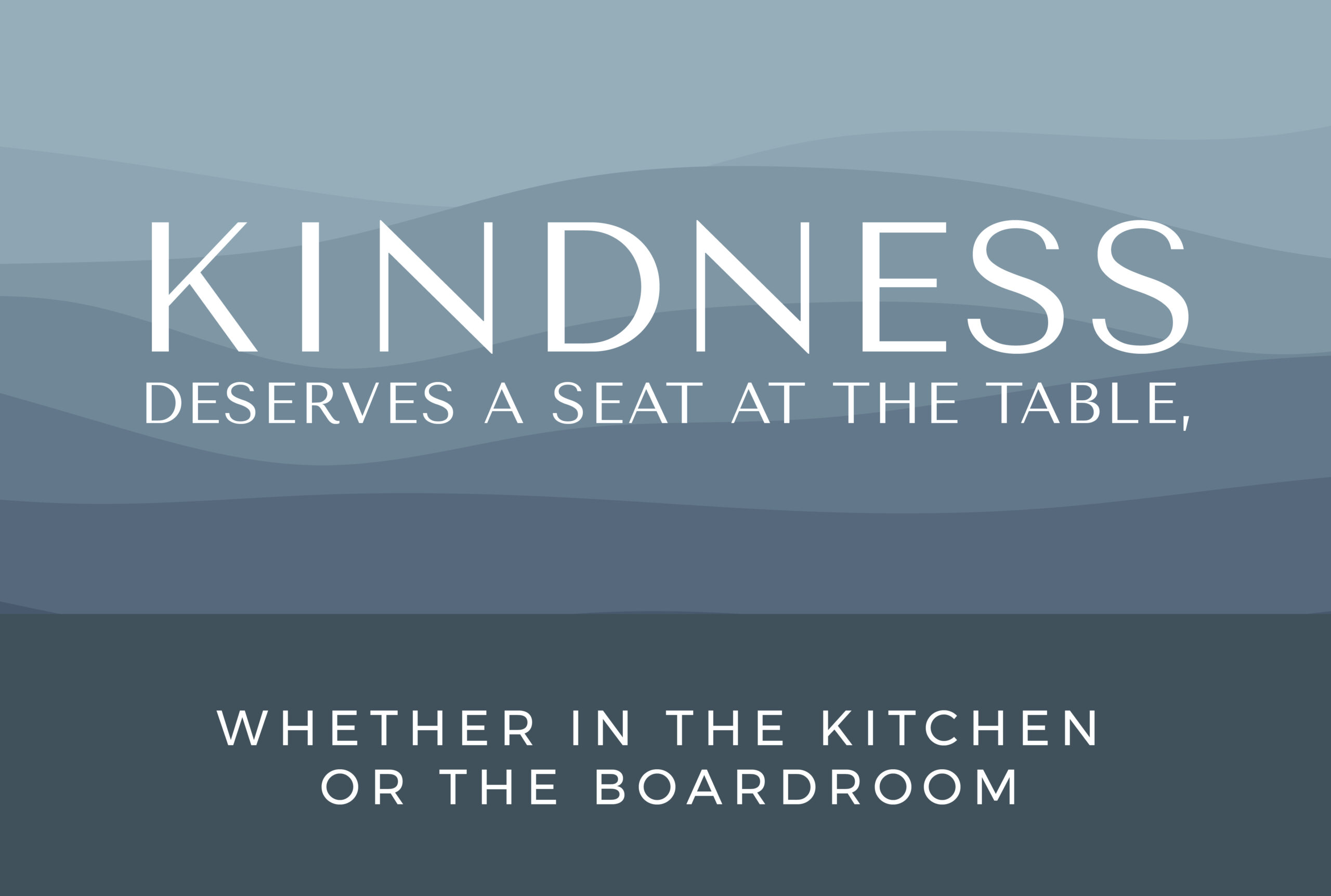
Kindness Deserves a Seat at the Table, Whether in the Kitchen or the Boardroom
One of the unspoken challenges of working from home, working remotely, or working largely in isolation is the lack of authentic opportunities for social interactions with colleagues, management, and our professional tribe. Many of us are seeing the lines of our home life and work life blur for the first time due to the pandemic, juggling the demands of childcare and Zoom meetings, and our working hours stretching late into the evening. Our carefully established boundaries, routines and life as normal have been uprooted and our aptitude for kindness is essentially non-existent, all while our appetite for human connection becomes nearly insatiable. We turn to social media to replace our face-to-face connections, which only furthers our inner turmoil and loneliness in a culture that seems to value division over unity with Keyboard Karen’s lurking in the shadows ready to add their vindictive two-cents to any, and every, post. Is it any wonder that we have lost touch with one of the greatest attributes we can embody and the windfall of benefits therein? It’s time to adapt to our new normal and to begin sprinkling kindness like confetti once again.
The Windfall of Benefits
With opportunities for ‘praise in passing’ limited by the pandemic, it is important to recognize the tangible benefits of kindness in the workplace. A yearlong compilation of surveys conducted by Gallup found that recognition at work could help to, “reduce employee burnout and absenteeism, and improves employee well-being.” Decades of research show that seemingly simplistic gestures like offering a compliment, words of recognition, and praise can help individuals to feel, “more fulfilled, boost their self-esteem, improve their self-evaluations, and trigger positive emotions.” The affirmation offered by praise confirms our self-worth and contributes to our positive view of ourselves.
Next, the act of being kind contributes to our perceived sense of life’s meaningfulness. When we are kind to others, it confirms our belief that there is more to life than ourselves. These acts of kindness also change the way we see ourselves, as our reputation and esteem in the mind of others is improved. We assess ourselves based on our behavior, so when we are kind to others we view ourselves as kind people, and therefore a good person.
Finally, giving to others makes us even happier than receiving from others. In various studies, participants who complimented one another found that giving the compliment made them even happier than receiving one. Compliments may seem trite, but the psychological steps taken to construe and offer a compliment are much deeper. When we give a genuine compliment it requires us to, “think about someone else—their mental state, behavior, personality, thoughts, and feelings.” Thinking about others is a necessary step in feeling connected to them. And this human connection, that we’ve all been desperately seeking throughout the pandemic, can lead to enhanced positivity in relationships ultimately driving our own happiness forward.
Bringing Kindness Back to the Workplace (Even If It’s Remote)
In order to create a culture of generosity and kindness within an organization, it is imperative that leadership leads by example. “By giving compliments and praising their employees, leaders are likely to motivate team members to copy their behavior and create norms of kindness in teams.”
Next, leaders can establish a time during Zoom meetings for a “kindness round”, close a call with an opportunity for employees to acknowledge each other’s work, or encourage a weekly “bright spot” submission in the weekly meeting notes. Just a few moments taken out of the norm can have significant impacts on moral and social connection. The key is consistency and an opportunity for peers to recognize one another publicly.
Finally, small spot bonuses, or tokens of appreciation, even if it’s ‘just’ a gift card for coffee or a thoughtful e-mail, can trigger the same psychological benefits of large acts of kindness without significant expense.
While we are busy switching loads of laundry, and prepping dinner between e-mails and Zoom calls, it can be easy to dismiss acts of kindness as frivolous. But, if we can pencil in one small gesture of kindness a week, or a day for our colleagues, management and professional tribe, the overwhelming minutia of survival mode can begin to look a bit more like thriving for ourselves and others. Our children are our best examples of unencumbered kindness, offering a hand picked dandelion, a smile to a stranger, or the last bite of their prized dessert. Let’s become a bit more childlike and a lot less jaded; the world needs more kindness than Karen’s.


Post a comment:
You must be logged in to post a comment.